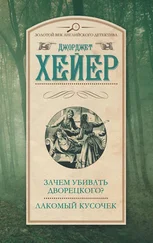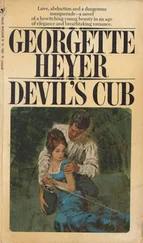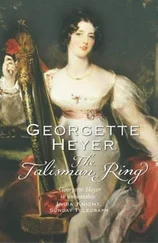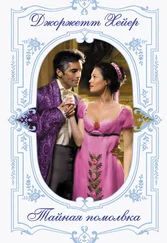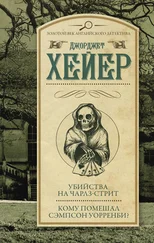Джорджетт Хейер - Penhallow
Здесь есть возможность читать онлайн «Джорджетт Хейер - Penhallow» весь текст электронной книги совершенно бесплатно (целиком полную версию без сокращений). В некоторых случаях можно слушать аудио, скачать через торрент в формате fb2 и присутствует краткое содержание. Год выпуска: 1942, Жанр: Детектив, на английском языке. Описание произведения, (предисловие) а так же отзывы посетителей доступны на портале библиотеки ЛибКат.
- Название:Penhallow
- Автор:
- Жанр:
- Год:1942
- ISBN:нет данных
- Рейтинг книги:3 / 5. Голосов: 1
-
Избранное:Добавить в избранное
- Отзывы:
-
Ваша оценка:
- 60
- 1
- 2
- 3
- 4
- 5
Penhallow: краткое содержание, описание и аннотация
Предлагаем к чтению аннотацию, описание, краткое содержание или предисловие (зависит от того, что написал сам автор книги «Penhallow»). Если вы не нашли необходимую информацию о книге — напишите в комментариях, мы постараемся отыскать её.
Penhallow — читать онлайн бесплатно полную книгу (весь текст) целиком
Ниже представлен текст книги, разбитый по страницам. Система сохранения места последней прочитанной страницы, позволяет с удобством читать онлайн бесплатно книгу «Penhallow», без необходимости каждый раз заново искать на чём Вы остановились. Поставьте закладку, и сможете в любой момент перейти на страницу, на которой закончили чтение.
Интервал:
Закладка:
She came forward now, with her well-manicured hand held out, and a polite word of greeting on her lips. The two ladies kissed, without conviction; Faith was placed in a chair with its back to the light; Rosamund sat down on the sofa at right-angles to her; and while she inquired civilly after all the members of the household at Trevellin, the neat house-parlourmaid quietly entered the room with a silver tray supporting a cut-glass decanter, and three sherry glasses, and set it down on the low table in front of her mistress. Faith noticed wistfully that the tray was brightly polished, and that the decanter and the glasses all matched each other.
“It seems an age since I saw you last,” remarked Rosamund. “Now, do tell me all about yourself. You’ll have a glass of sherry, won’t you?”
Faith accepted the sherry, remembered to ask after the three daughters of the house, and prepared to unbosom herself.
Rosamund listened to her with an air of calm interest, offering neither criticism nor advice. In reality she was not at all interested. She disliked her husband’s maternal relatives, and profoundly disapproved of them. There was a raffishness about them that offended her sense of propriety. She was sorry that her husband’s occupation necessitated his residing within eight miles of Trevellin; and although she never made any attempt to stop his consorting with his cousins, she herself did not visit Trevellin more frequently than she was obliged to. She was aware of the circumstances which made it desirable for Clifford to accept Clay as an articled pupil, and .although she felt that it was disgraceful that his hand should have been forced in such an unscrupulous manner, she considered the entry of a young man, however unwanted, into the firm as preferable to the entry of Clara into her well-ordered house. She never permitted herself to utter any criticism of her mother-in-law, but she privately thought her an extremely trying cold lady, eccentric in her behaviour, not over-clean in her habits, and very injudicious in her spoiling of her nicely behaved granddaughters.
It was not, then, to be expected that Rosamund would support Faith in her endeavour to keep— Clay out of Clifford’s office. However, she lent an indulgent ear to Faith’s rather agitated history of the morning’s interview with Penhallow, and agreed with perfect sincerity that he had behaved in a thoroughly ill-bred and overbearing manner. She even bore with unmoved composure Faith’s disparaging comments on Clifford’s profession. and did not allow herself to do more than raise her plucked eyebrows slightly at Faith’s assertion that Clay’s intellect was of too high an order for the law.
Clifford came in a little after half-past one o’clock, but any hopes Faith might have cherished of reopening the discussion with him were blighted by the houseparlourmaid’s announcement that luncheon was served. Rosamund said: “You know the way, Faith,” and Faith preceded her across the hall to the dining-room in the front of the house. Here the three little girls, Isabel, Daphne, and Monica, awaited them, and any private conversation had naturally to be abandoned. The children, who attended a day-school in the town, were dressed alike, and closely resembled their mother. They were very well brought up, answered politely when spoken to, and prattled, until hushed by a sign from Rosamund, about their activities at school. Clifford was very proud of them, and encouraged them to show off by asking them leading questions. It was obvious that while they were present he had no attention to spare for Faith’s troubles, and as he looked at his wrist-watch when they all rose from the table, and exclaimed that he had an appointment, and must hurry off immediately, it became equally obvious that he did not intend, at least for the present, to go any further into the question of Clay’s future. Saying that he knew Faith would excuse him, he bustled away. The two ladies returned to the drawing-room for coffee; Rosamund told Faith what the head-mistress at St Margaret’s School had said to her about Isabel’s music; and how Monica seemed to have a real talent for dancing; and how the head-mistress believed that Daphne was going to be an influence for good in the school. Faith complimented Rosamund upon her excellent management of her children, and her household, and wondered how she contrived to get such well-trained servants in these days. In this innocuous fashion, an hour passed, at the end of which time Faith said that she must really be going. Rosamund, who was going out to a bridge-party, made no effort to detain her; the under-gardener was hailed from the kitchen, where he had been regaling the cook and the houseparlourmaid and the nursery-maid with tales of the goings-on up at Trevellin; and Faith, after bidding farewell to her hostess, once more entered the landaulette, and was driven back to Trevellin.
Chapter Five
Raymond Penhallow’s day, since, in addition to the estate, he managed not only the hunting stables, but a small stud-farm as well, began at a very early hour, for although he employed an excellent stud-groom, and Weens, the hunting-groom, had worked at Trevellin since boyhood, he was not the man to entrust the all-important business of grooming, feeding, and exercising to underlings. No groom, using a brush on a shedding coat, or seeking to impart a gloss to a coat by the administration of surreptitious doses of arsenic, could ever feel himself safe from the Master’s penetrating eye. He had an uncomfortable habit of appearing in the stables when least expected, and no fault of omission or commission ever escaped him when he made his daily round of inspection. He was respected without being very much liked; and it was generally agreed that he was an extremely ill man to cheat.
His brothers Ingram and Bart were both joined with him in the management of the stud-farm and the stables, the former having been started some years previously largely on Ingram’s representations to his father that something must be done to bolster up the dwindling finances of the estate, and that the upland situation of Trevellin made it particularly suitable for breeding purposes. But if Ingram was responsible for obtaining Penhallow’s consent to the scheme, the original inspiration was Raymond’s. It was due to Raymond’s sound sense and driving-force that the ramshackle old stables, with all their abuses of hay-lofts, high-racks, and cloying stalls, had been pulled down, and modern buildings erected in the form of a quadrangle upon a more convenient site. It was due to Raymond’s hard headedness that Bart’s wild plan of breeding race-horses was nipped in the bud. It was due to his unerring eye that few unsound horses ever found their way into the Trevellin stables. Even Penhallow, who lived at loggerheads with him, grudgingly admitted his ability to judge a horse, and could never be prevailed upon to support Ingram or Bart in any disagreement with him on the questions of buying or breeding.
Only a year separated Raymond and Ingram. They rcsembled one another in that both were very dark, with aquiline features and their father’s piercing grey eyes, but Ingram was half a head the taller, a circumstance which was a source of considerable annoyance to him, since it necessitated his riding only big, strong hunters. They had shared the same nursery, had gone to the same schools, possessed the same tastes and interests, and had never, all their lives, been able to agree. As boys, they had fought incessantly; as young men, neither had lost an opportunity to thrust a spoke in the other’s wheel; now that they had reached middle-age they preserved an armed neutrality, each being on the alert to circumvent any attempt on the part of the other to interfere with jealously guarded rights and prerogatives. The World War of 1914-1918 had left Ingram with a permanently stiff leg. He had served with distinction in a cavalry regiment, and had won the Military Cross. Raymond, producing food for the nation under Penhallow, had been exempt from military service.
Читать дальшеИнтервал:
Закладка:
Похожие книги на «Penhallow»
Представляем Вашему вниманию похожие книги на «Penhallow» списком для выбора. Мы отобрали схожую по названию и смыслу литературу в надежде предоставить читателям больше вариантов отыскать новые, интересные, ещё непрочитанные произведения.
Обсуждение, отзывы о книге «Penhallow» и просто собственные мнения читателей. Оставьте ваши комментарии, напишите, что Вы думаете о произведении, его смысле или главных героях. Укажите что конкретно понравилось, а что нет, и почему Вы так считаете.



